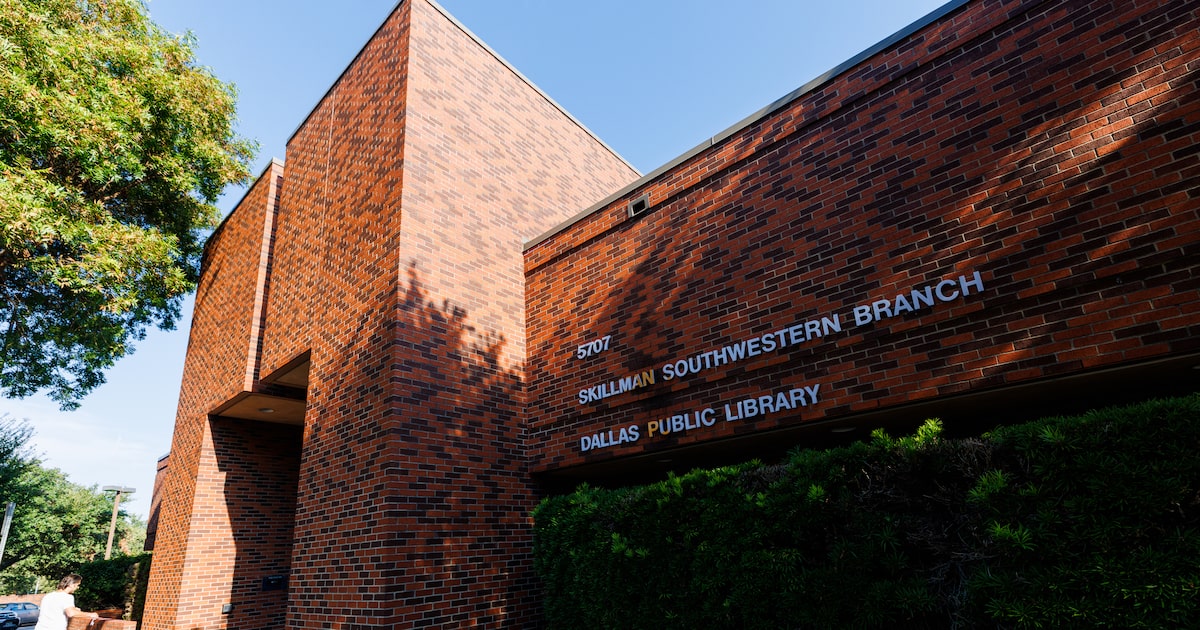An East Dallas library might be saved from closure for the second year in a row.
In nonbinding straw votes, the council signaled preliminary support for budget amendments totaling more than $722,000, redirecting federal COVID relief money and a portion of the city staff’s professional development funds.
The amendments would change the $5.2 billion budget presented in August by City Manager Kimberly Bizor Tolbert. City leaders have until Sept. 17, when the budget is scheduled to be adopted, to make changes. It goes into effect Oct. 1.
The council supported allocating $386,612 to keep the Skillman Southwestern Branch Library open for another year, using funds originally earmarked for a program that helps homeowners connect septic systems to city water and sewer lines.
Political Points
Under the proposal, the library would operate three days a week for eight hours, down from its current five-day schedule.
City officials have attempted to close the library this year and last, citing that fewer people use it than other branches. They also pointed to a newer, larger site, the Vickery Park Branch Library, less than two miles away. Though separated from Skillman by the East Northwest Highway, that library is open every day.
Related

But council member Paula Blackmon, who represents the area, argued for keeping the Skillman Southwestern facility open while the city develops a new strategy for its entire library system, which is expected to take at least a year. Dallas Public Library Director Manya Shorr has said her idea is to move to a model with fewer locations and longer operating hours.
Shorr said the reduced hours would limit services to basic access.
“The plan is not to offer programs or outreach,” she said. “It’s really just opening the doors and having the collection available.”
Skillman Southwestern is the only library planned to close in this budget, but up to four other sites could be on the chopping block next year, city officials have said.
“I hope that people will support this,” Blackmon said to her colleagues ahead of straw votes on the amendment. “It’s a community facility, and it is utilized and people are passionate about it.”
Council member Cara Mendelsohn argued against moving funding from the American Rescue Plan Act for a septic program to keep the library open and criticized the idea of redirecting funds meant for underserved southern Dallas neighborhoods for a library further north repeatedly recommended by the city manager to be shut down.
“The one-time chance happened,” said Mendelsohn, who represents Far North Dallas. “We are past that, and I’m going to support the city manager’s recommendation to close the library.”
The $2.2 million septic program, approved in 2023, was designed to help homeowners in 47 areas — mostly in southern Dallas — connect to the city’s water and sewer system. However, only 23 of 200 notified homeowners have participated. Some residents declined due to concerns about unwanted future development and displacement.
Tolbert and Sarah Standifer, director of Dallas Water Utilities, confirmed the program is voluntary and said the city will continue outreach efforts. Another 200 homeowners are still awaiting line installations before they can choose to participate, they said.
Council member Lorie Blair, whose district includes many of the impacted residents, noted that connecting to the city’s sewer system costs about $16,000 per homeowner. She added that some residents prefer to keep their rural lifestyle and have chosen not to participate, though the program remains available to those who want it.
Mendelsohn warned that redirecting these funds now could leave no money for future septic connections. She also argued that if the council can’t close one underused library, it will struggle with tougher decisions in the future, like closing multiple libraries next year.
Ten council members signaled support to shift the money to keep the library open: Blackmon, Blair, Adam Bazaldua, Laura Cadena, Zarin Gracey, Jaime Resendez, Paul Ridley, Kathy Stewart, Chad West and Gay Donnell Willis.
The City Council also supported Blair’s request to use $66,598 in her ARPA funds to keep her District 8 Neighborhood Services Office open for another year.
The office, at 3624 Simpson Stuart Road, was originally the Highland Hills Library before being converted into a community office in 2008. Blair said she learned of plans to relocate the office after she was elected in June but believes keeping it open for now is best for her district.
She said the office serves over 1,100 residents monthly, providing assistance with housing, code compliance and WIC (Women, Infants and Children) services.
“It is a trusted space where neighbors come together, needs are addressed and solutions are built collaboratively,” Blair said, adding that it would also ensure accessibility and continuity of services while she and the city manager work on a long-term solution for the building.
A proposal from Mendelsohn to cut professional and personnel development conference fees by 10% for all departments in the general fund was also supported, shifting $269,000 to unspecified street maintenance. Most city departments are in the general fund, such as police, fire, code compliance, housing, parks, human resources and the mayor and City Council offices.
She noted the latest community survey shows residents’ top priorities are street maintenance, sidewalks and other infrastructure. Mendelsohn said the city spends $2.69 million a year on professional development for employees in general fund departments, which includes sending them to work conferences.
“I’m just going to say it’s excessive,” she said.
Mayor Eric Johnson and council members Blackmon, Blair, Gracey, Mendelsohn, Ridley, Stewart, Willis, Maxie Johnson, Jesse Moreno and Bill Roth supported the proposal.
Nine other budget proposals failed to gain enough support on Wednesday. Among them were two amendments from Bazaldua, which aimed to redirect $3 million — originally allocated to lower the property tax rate — toward addressing homelessness and street maintenance.
Another five proposals from Mendelsohn didn’t get sufficient backing. These included plans to shift nearly $3 million to increase maintenance for streets and Old City Park, extend weekend and evening hours at some library branches, close all nine of the city’s nine community pools in the upcoming fiscal year, cut one staff position from each of the 14 council members’ offices, eliminate a new position planned for the government affairs office, reduce the human resources department budget by 10% (about $440,000) and close two libraries by April.
Tolbert announced plans to introduce an amendment later this month to increase funding for Dallas Animal Services, following concerns raised by council members about inadequate shelter space, high numbers of loose and aggressive animals and a lack of spay and neuter services.
Two proposals from Bazaldua and Willis to allocate a total of $2.9 million to Dallas Animal Services were withdrawn. Bazaldua had proposed using $2.5 million from money intended to lower the property tax rate, while Willis suggested shifting $400,000 from the city’s plans to add more bike lanes.
Willis noted that the city’s animal services ran out of money for spay and neuter services just six months into the current fiscal year. Stewart shared that residents in her northeast Dallas district have expressed concerns about the department’s needs, emphasizing that she believes additional resources are necessary to help the city manage its stray pet population. She said her appointee on the Dallas animal advisory commission resigned out of frustration with the city’s system.
